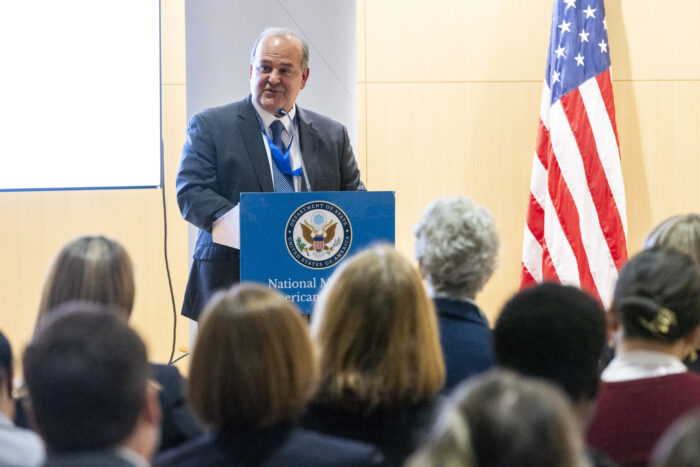By Tom Yazdgerdi, President, American Foreign Service Association, with an introduction by Katherine A. Brown, Ph.D., President & CEO, Global Ties U.S.
Global Ties U.S. is excited to celebrate alongside our partner, the American Foreign Service Association (AFSA), the centennial of the U.S. Foreign Service. I started my career in the U.S. Department of State, working with Foreign Service Officers in Washington, DC and in Kabul, Afghanistan, and I found the Global Ties Network after asking our diplomats in embassies overseas which public diplomacy tools were most critical to their work. The International Visitor Leadership Program (IVLP) was consistently cited as the singular, indispensable tool to build the relationships and networks with global leaders that make mitigating today’s challenges possible. Tom Yazdgerdi, AFSA’s President, reflects on this in the piece below, citing the critical role the Global Ties Network plays in mobilizing citizen diplomats in 80 communities to support U.S. diplomacy right here in the United States.

Tom Yazdgerdi speaks to the Global Ties Network at a Global Ties U.S. 2024 National Meeting event at the National Museum of American Diplomacy. Photo Credits: Kristoffer Tripplaar
Our diplomats are a small workforce numbering just over 16,000; their talent, grit, and routine sacrifice has enabled us to maintain global leadership for decades. Their contributions to our national security are often invisible, but they are invaluable. Nonetheless, they are grossly underfunded: U.S. international affairs spending is less than 1% of the federal budget. For more than 60 years, the Global Ties Network has provided an essential partnership to the Foreign Service: making IVLP and other professional exchange programs so meaningful for the global leaders who travel to their communities across the United States and being the leading constituents for the International Affairs Budget.
We hope you’ll join us in celebrating our diplomatic corps this week, and the invaluable partnership between the Global Ties Network and the U.S. Foreign Service that makes our collective diplomatic work possible. Together we are building stronger communities and stronger alliances. You can support this work and join us in advocating for the Foreign Service by visiting the AFSA’s website at afsa.org/centennial. Learn more about the power of partnerships within the Global Ties Network HERE, and read on for Tom’s piece and opportunities to amplify the centennial celebration:
On May 24, we celebrate the centennial of the Rogers Act— landmark legislation that laid the foundation of the modern U.S. Foreign Service by establishing a merit-based hiring system and consolidating the consular and diplomatic services into a single entity. The year 1924 also marked the birth of the American Foreign Service Association (AFSA), which now represents the interests of nearly 17,000 people across six U.S. foreign affairs agencies, including the U.S. State Department and the U.S. Agency for International Development. As we recognize these significant milestones, it’s natural to reflect on a century of U.S. diplomacy, while also looking at the pressing challenges ahead that threaten the very democratic values we hold so dear.
We would be remiss if we didn’t also take the time to reflect on the vital partnerships that make U.S. diplomacy possible, including the unique connection between our citizen diplomats and the Foreign Service. This public-private collaboration remains crucial to our nation’s continued security and prosperity.
The interplay between these two groups is most evident through the success of our international exchange programs, especially the flagship U.S. Department of State International Visitor Leadership Program (IVLP). Foreign Service members play a vital role in the early stages of these exchanges by vetting and recommending participants for travel to the United States.
Back home in the United States, our citizen diplomats, ably organized and assisted by Global Ties U.S., offer these esteemed visitors unparalleled personal insights into U.S. culture and our way of life. Approximately 4,000 current and emerging leaders from around the world participate in the IVLP each year, visiting communities across the United States and connecting with tens of thousands more U.S. counterparts in all 50 U.S. states. The IVLP today includes more than 225,000 alumni, including more than 500 current and former heads of state and government throughout the world. I can’t think of a better investment than giving promising global leaders the opportunity to learn about U.S. values while they build relationships that will foster greater international understanding for years to come.
A helpful metaphor for this critical relationship is that of a bridge crew working on opposite riverbanks. Foreign Service diplomats engage with nations from the international side, establishing the foundational aspects of global relationships. On the other bank, citizen diplomats welcome international visitors, introducing them to U.S. counterparts from all walks of life. Both sides converge in the middle of the bridge, connecting these worlds through mutual understanding.
So, as we embark on the next chapter of U.S. diplomacy, the centennial of the Foreign Service calls us to redouble our diplomatic efforts at a critical moment in history. We face growing and unprecedented global threats, and we need our partners and allies now more than ever. As president of the American Foreign Service Association, I call on our great citizen diplomats to join us as we advocate for a strong Foreign Service that can confront these challenges. Showing support for the Foreign Service on social media using our centennial toolkit is a great place to start.
Together, we can help build a safer and more prosperous future for all.
